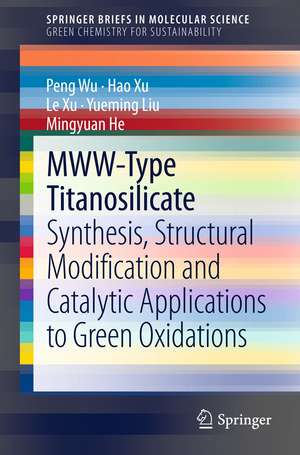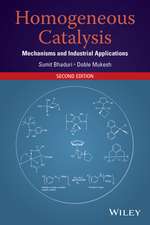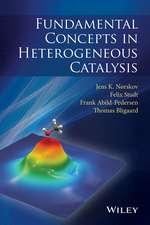MWW-Type Titanosilicate: Synthesis, Structural Modification and Catalytic Applications to Green Oxidations: SpringerBriefs in Molecular Science
Autor Peng Wu, Hao Xu, Le Xu, Yueming Liu, Mingyuan Heen Limba Engleză Paperback – 20 aug 2013
Din seria SpringerBriefs in Molecular Science
-
 Preț: 411.46 lei
Preț: 411.46 lei -
 Preț: 379.09 lei
Preț: 379.09 lei -
 Preț: 356.49 lei
Preț: 356.49 lei -
 Preț: 441.25 lei
Preț: 441.25 lei -
 Preț: 389.70 lei
Preț: 389.70 lei -
 Preț: 376.22 lei
Preț: 376.22 lei -
 Preț: 348.77 lei
Preț: 348.77 lei -
 Preț: 345.14 lei
Preț: 345.14 lei -
 Preț: 347.69 lei
Preț: 347.69 lei -
 Preț: 346.70 lei
Preț: 346.70 lei -
 Preț: 376.43 lei
Preț: 376.43 lei -
 Preț: 342.14 lei
Preț: 342.14 lei -
 Preț: 375.23 lei
Preț: 375.23 lei -
 Preț: 375.23 lei
Preț: 375.23 lei -
 Preț: 376.59 lei
Preț: 376.59 lei - 15%
 Preț: 461.73 lei
Preț: 461.73 lei -
 Preț: 378.12 lei
Preț: 378.12 lei -
 Preț: 376.59 lei
Preț: 376.59 lei -
 Preț: 376.59 lei
Preț: 376.59 lei -
 Preț: 375.23 lei
Preț: 375.23 lei -
 Preț: 351.18 lei
Preț: 351.18 lei -
 Preț: 377.73 lei
Preț: 377.73 lei -
 Preț: 372.73 lei
Preț: 372.73 lei -
 Preț: 378.54 lei
Preț: 378.54 lei -
 Preț: 376.96 lei
Preț: 376.96 lei -
 Preț: 377.35 lei
Preț: 377.35 lei -
 Preț: 378.12 lei
Preț: 378.12 lei -
 Preț: 376.04 lei
Preț: 376.04 lei -
 Preț: 346.59 lei
Preț: 346.59 lei -
 Preț: 375.45 lei
Preț: 375.45 lei -
 Preț: 377.73 lei
Preț: 377.73 lei -
 Preț: 381.00 lei
Preț: 381.00 lei -
 Preț: 377.18 lei
Preț: 377.18 lei -
 Preț: 376.96 lei
Preț: 376.96 lei -
 Preț: 380.07 lei
Preț: 380.07 lei -
 Preț: 376.22 lei
Preț: 376.22 lei -
 Preț: 343.72 lei
Preț: 343.72 lei -
 Preț: 376.22 lei
Preț: 376.22 lei -
 Preț: 377.35 lei
Preț: 377.35 lei -
 Preț: 343.72 lei
Preț: 343.72 lei -
 Preț: 376.22 lei
Preț: 376.22 lei -
 Preț: 375.07 lei
Preț: 375.07 lei -
 Preț: 374.85 lei
Preț: 374.85 lei - 15%
 Preț: 464.97 lei
Preț: 464.97 lei -
 Preț: 376.43 lei
Preț: 376.43 lei -
 Preț: 341.75 lei
Preț: 341.75 lei -
 Preț: 374.30 lei
Preț: 374.30 lei -
 Preț: 375.23 lei
Preț: 375.23 lei -
 Preț: 377.57 lei
Preț: 377.57 lei
Preț: 379.09 lei
Nou
Puncte Express: 569
Preț estimativ în valută:
72.54€ • 75.74$ • 59.90£
72.54€ • 75.74$ • 59.90£
Carte tipărită la comandă
Livrare economică 15-29 aprilie
Preluare comenzi: 021 569.72.76
Specificații
ISBN-13: 9783642391149
ISBN-10: 3642391141
Pagini: 136
Ilustrații: VIII, 125 p. 79 illus., 25 illus. in color.
Dimensiuni: 155 x 235 x 7 mm
Greutate: 0.2 kg
Ediția:2013
Editura: Springer Berlin, Heidelberg
Colecția Springer
Seriile SpringerBriefs in Molecular Science, SpringerBriefs in Green Chemistry for Sustainability
Locul publicării:Berlin, Heidelberg, Germany
ISBN-10: 3642391141
Pagini: 136
Ilustrații: VIII, 125 p. 79 illus., 25 illus. in color.
Dimensiuni: 155 x 235 x 7 mm
Greutate: 0.2 kg
Ediția:2013
Editura: Springer Berlin, Heidelberg
Colecția Springer
Seriile SpringerBriefs in Molecular Science, SpringerBriefs in Green Chemistry for Sustainability
Locul publicării:Berlin, Heidelberg, Germany
Public țintă
ResearchCuprins
Introduction.- Synthesis of Ti-MWW zeolite.- Post-synthesis modification of Ti-MWW: a door to diversity.- Catalytic properties of Ti-MWW in selective oxidation reactions.- Conclusions and Prospects.
Notă biografică
Peng Wu completed his BSc (1988) at Nanjing University (China) and obtained his Ph.D. (1996) from Tokyo Institute of Technology, before working as a postdoctoral fellow first at Tokyo Institute of Technology and then at Hokkaido University, Japan (1996-1999). In 1999, he moved to Yokohama National University and worked as a visiting Assistant Professor. Since 2003, he has been a full professor of physical chemistry at East China Normal University, Shanghai (China), where he holds the Cheung Kong Professorship. His research interests include design synthesis and applications of zeolites and related porous materials for environmentally friendly chemical processes. He received the Outstanding Young Researcher award from the Japan Petroleum Institute (2003) and Catalysis Society of Japan (2004), Shanghai Municipality Science and Technology Award (2007), and National Science Fund of China for Distinguished Young Scholars (2009) etc. He has published more than 150 scientific papers and holds 30 patents.
Textul de pe ultima copertă
This book provides a comprehensive review of a new generation of selective oxidation titanosilicate catalysts with the MWW topology (Ti-MWW) based on the research achievements of the past 12 years. It gives an overview of the synthesis, structure modification and catalytic properties of Ti-MWW. Ti-MWW can readily be prepared by means of direct hydrothermal synthesis with crystallization-supporting agents, using dual-structure-directing agents and a dry-gel conversion technique. It also can be post-synthesized through unique reversible structure transformation and liquid-phase isomorphous substitution. The structural conversion of Ti-MWW into the materials usable for processing large molecules is summarized. Taking advantage of the structure diversity of the lamellar precursor of Ti-MWW, it can be fully or partially delaminated, and undergo interlayer silylation to obtain a novel structure with larger porosity. In the selective oxidation (alkene epoxidation and ketone/aldehyde ammoximation) with hydrogen peroxide or organic peroxide as an oxidant, the unique catalytic properties of Ti-MWW are described in comparison to conventional titanosilicates such as TS-1 and Ti-Beta.
Caracteristici
Provides a complete overview of the Ti-MWW catalyst Describes detailed synthesis methods for preparing Ti-MWW that differ from conventional techniques Shows the special role of Ti-MWW titanosilicate in structure change, which improves its catalytic performance Covers useful reactions catalyzed by Ti-MWW zeolite Includes supplementary material: sn.pub/extras





